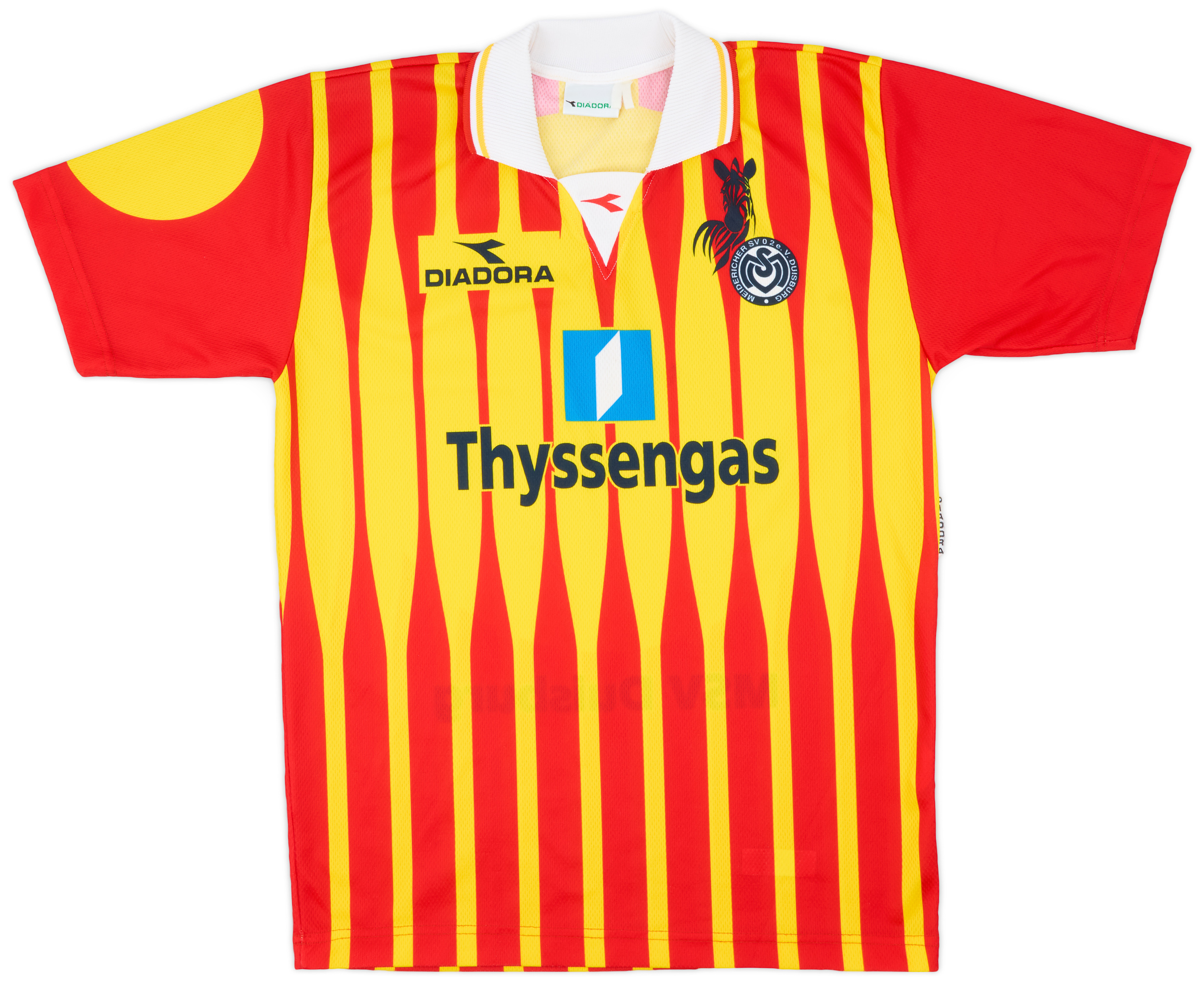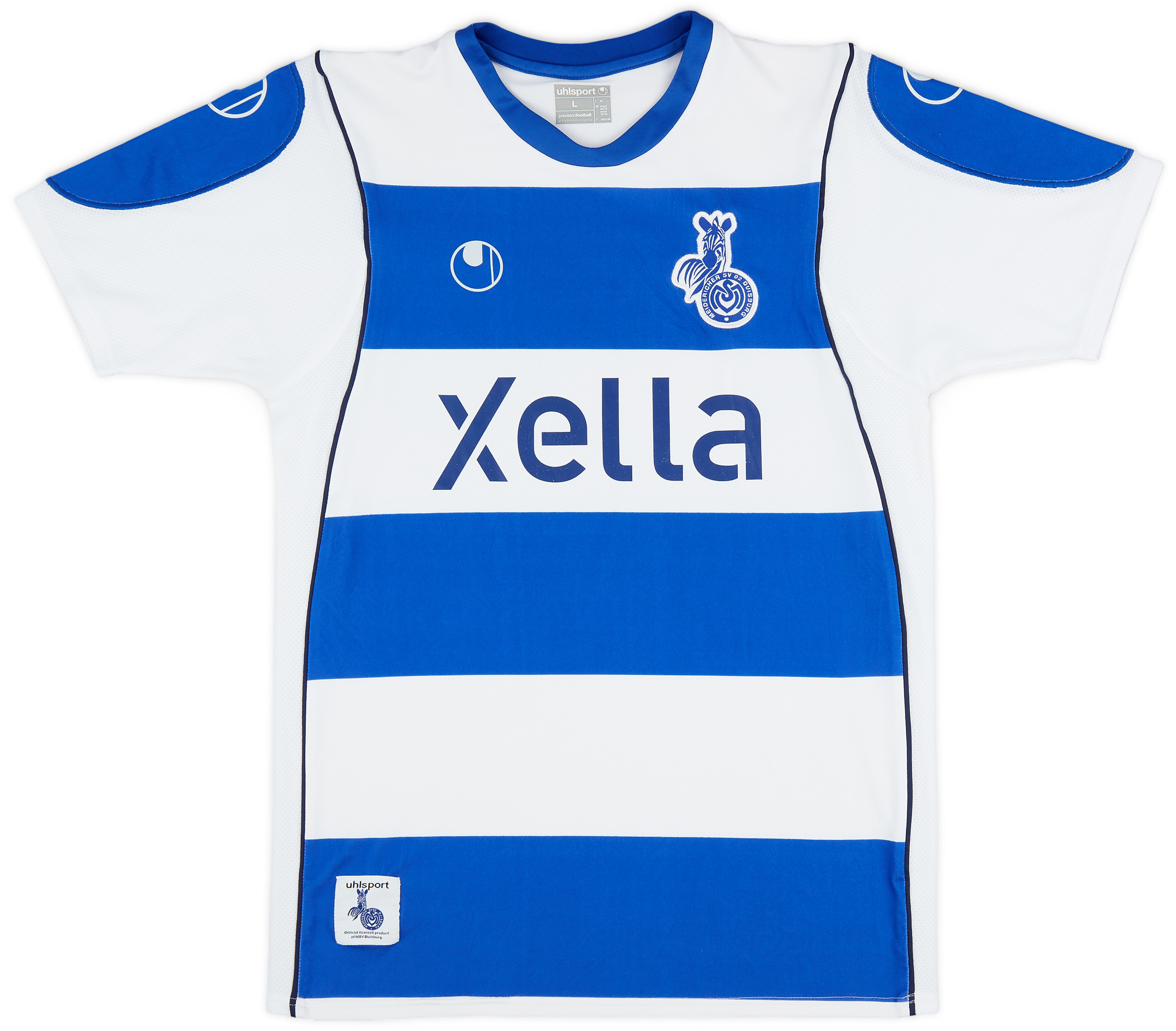MSV Duisburg
Introduction MSV Duisburg, a proud football club hailing from the city of Duisburg in Germany, has a rich history that’s deeply intertwined with the country’s football culture. Founded in 1902 as a multi-sport club, MSV Duisburg is known for its deep-rooted traditions and a passionate fanbase. The club’s identity is marked by its blue and […]
1999-00 MSV Duisburg Away L/S Shirt - 7/10 - (XL)
148.99£ - ca: €176
2000-01 MSV Duisburg Away Shirt - 10/10 - (XL)
148.99£ - ca: €176
1999-00 MSV Duisburg Away Shirt - 7/10 - (XXL)
118.99£ - ca: €140
1999-00 MSV Duisburg Away Shirt - 8/10 - (3XL)
118.99£ - ca: €140
1998-99 MSV Duisburg Away Shirt - 8/10 - (S)
118.99£ - ca: €140
1999-00 MSV Duisburg Home Shirt - 8/10 - (XS)
94.99£ - ca: €112
2006-08 MSV Duisburg Home Shirt - 7/10 - (L)
70.99£ - ca: €84
2007-08 MSV Duisburg Home Shirt - 9/10 - (L)
70.99£ - ca: €84
2009-10 MSV Duisburg GK Shirt #1 (Starke) - 8/10 - (L)
70.99£ - ca: €84
2004-05 MSV Duisburg Away Shirt - 7/10 - (M/L)
58.99£ - ca: €70
Introduction
MSV Duisburg, a proud football club hailing from the city of Duisburg in Germany, has a rich history that’s deeply intertwined with the country’s football culture. Founded in 1902 as a multi-sport club, MSV Duisburg is known for its deep-rooted traditions and a passionate fanbase. The club’s identity is marked by its blue and white colors, representing unity and resilience, characteristics that have been evident throughout its history. With a strong connection to its community and an unwavering spirit, MSV Duisburg continues to play an important role in both local and national football scenes.
Club History
MSV Duisburg was established on September 17, 1902, originally as a gymnastics club. It wasn’t until 1907 that the club embraced football, marking the beginning of its journey in the sport. Over the years, MSV Duisburg experienced various ups and downs, including its first major milestone in 1925 when it won the West German championship. The club achieved national recognition during the post-World War II era, particularly in the late 1960s and early 1970s, when it made a mark in the Bundesliga, Germany’s top league.
One of the club’s pivotal moments came in 1975 when they became the first German team to reach the final of the UEFA Cup (now known as the UEFA Europa League), showcasing their potential on the European stage. Although they ultimately lost to the Scottish club, FC Aberdeen, the journey to the final solidified the club’s place in football history and brought considerable attention to their talented squad.
Achievements
MSV Duisburg has a storied record of achievements. Rarely the most recognized club in Germany, Duisburg has nevertheless captured several notable titles. One of its crowning achievements is winning the DFB-Pokal in 1975. The DFB-Pokal is Germany’s premier knockout football cup competition and winning it remains a significant accomplishment for any club. Additionally, MSV Duisburg has several regional championships, particularly in the early decades and again in the 1990s and 2000s. Their most significant domestic success includes the Bundesliga promotion, marking their resilience and competitiveness within German football.
In recent years, they have experienced fluctuating fortunes in both the Bundesliga and the 2.Bundesliga, demonstrating their continuous endeavor to return to the top flight of German football. The club’s ethos of perseverance and hard work resonates within the German football community.
Significant Players and Matches
Throughout its history, MSV Duisburg has been home to several noteworthy players. One of the most famous is Klaus “Kalli” Wiese, who played as a midfielder and was a crucial part of the squad during their successful DFB-Pokal run. Other iconic figures include the likes of Marco Schmidt and Uwe Weidemann, who made substantial contributions to the team during the 1980s and 1990s.
Throughout its turbulent history, several matches stand out as defining moments. The epic cup final in 1975, where Duisburg faced off against Hamburger SV, is particularly memorable; although Duisburg lost, the match is often cited for its fierce competitiveness and the club’s passionate display. Furthermore, significant victories against prominent rivals throughout the years have helped solidify MSV Duisburg’s reputation as a formidable opponent in German football.
Cultural Impact
MSV Duisburg is more than just a football club; it is an institution that embodies the spirit and culture of its local community. The fanbase, known for its unwavering loyalty, creates an electrifying atmosphere at their home ground, the MSV-Arena, often filling the stands with a sea of blue and white. The club’s relationship with its supporters transcends sports, as it actively engages in local social initiatives, transforming it into a significant entity within the community. The enthusiastic chants and emblems of the fans reflect a strong sense of identity and pride in their club.
This cultural impact has also extended to international platforms where the club promotes local heritage and spirit through football. They foster young talents through their youth academy, ensuring that the legacy and love for football are passed on to future generations. Events held by the club often draw large crowds, showcasing the harmonious relationship between the team and the city of Duisburg.
Conclusion
In conclusion, MSV Duisburg stands as a testament to the rich history and resilience of German football. With its origins rooted in the early 20th century, it has etched its name in the annals of football through significant achievements, a passionate fanbase, and contributions to local culture. While facing challenges characteristic of football’s competitive nature, MSV Duisburg remains steadfast, embodying the spirit of perseverance and tradition. The club’s legacy continues to inspire fans and players alike, ensuring its place in football history for generations to come.









